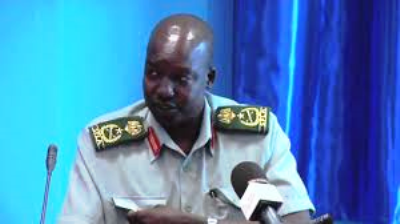S. Sudan rebel leader seeks global support to remove Kiir
October 28, 2017 (JUBA) – A South Sudanese rebel leader says he visited the United Nations headquarters in New York to solicit the support needed for voices that can highlight the plight of the suffering population so that President Salva Kiir can be removed from power.

“I went to New York not as an ordinary south Sudanese but as the leader of the National Salvation Front to raise the voice and plights of our people to the world leaders. You know the ordinary South Sudanese today paying the brunt of the conflict they do not know the cause,” said Swaka.
He added, “What I know about our people is that even before the conflict erupted in 2013, the people were actually very, very tired of Salva Kiir’s regime, a regime that is discriminating against them on the basis of their ethnicity; a regime that is practicing corruption; which has actually messed up the economy of the country”.
According to the army logistic chief-turned rebel leader, costs of living in government-controlled areas are unaffordable for many, while the majority of the population either fled the country or live in UN protection of civilian sites.
“We don’t need to about Unemployment. It has been an issue before the fighting took place. The employment opportunities in civil servants are given on the basis of ethnicity and clannism. The members of the minority tribes are not feeling that they are properly integrated in society. They do not feel as if they are part of South Sudan. They don’t feel as if their contribution in the liberation struggle that culminated into secession has been recognition,” stressed the rebel leader.
“The resources of the country are being controlled by a tribe. So everyone feel excluded and this is the actual root to be addressed”, he further explained.
Cirilo said he formed a rebel movement relevant to the people because he and his group are allegedly championing the cause of the majority of South Sudanese.
In March, Swaka, a former deputy chief of staff for logistics, formed a new rebel group, opposed to the Juba regime under President Kiir.
Swaka, who now heads the National Salvation Front (NAS), quit the military, accusing its leadership of running the army on ethnic lines.
“The National Salvation Front (NAS) is convinced that to restore sanity and normalcy in our country, Kiir must go, he must vacate the office without further bloodshed,” he partly wrote in a six page letter.
The former army official vowed to ensure all means are used to restore law, order and ensure respect for human rights in the country.
“It is in this spirit of dedication to the cause of our people that I, General Thomas Cirillo Swaka, on behalf of the National Salvation Front, solemnly declare the launching of the National Salvation Front (NAS) on this 6th Day of March, 2017,” further noted Swaka’s letter.
He also claimed the country was dominated by Dinka tribe and the army turned into a tribal militia that “targets non-Dinka ethnicities”.
In August, South Sudan released at least 30 political prisoners following an amnesty President Kiir had declared in May to facilitate the national dialogue initiative created to reconcile warring parties.
Analysts say the move to free the former political detainees without any pre-condition demonstrated Kiir’s determination to resolve the country’s civil war.
South Sudan has experienced violence since December 2013 when political disagreements between President Kiir and the nation’s former First Vice-President saw the nation split along ethnic lines. Tens of thousands of people have died and over two million displaced in South Sudan’s worst violence since its independence.
(ST)
